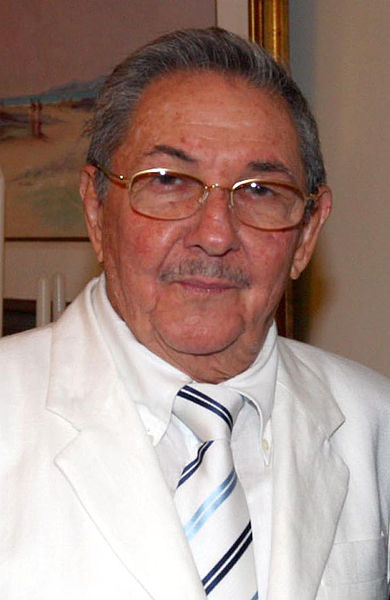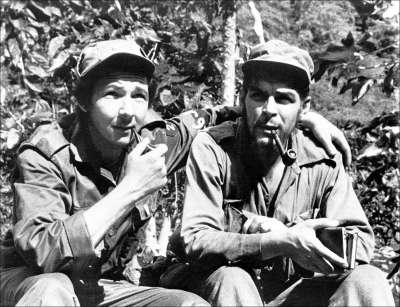<Back to Index>
- President of the Council of Ministers of Cuba Raúl Modesto Castro Ruz, 1931
PAGE SPONSOR


Raúl Modesto Castro Ruz (born 3 June 1931) is a Cuban politician and revolutionary who has been President of the Council of State of Cuba and the President of the Council of Ministers of Cuba since 2008; he previously exercised presidential powers in an acting capacity from 2006 to 2008. Raúl Castro was a rebel commander during the 1950s; after his older brother, Fidel Castro, took power, Raúl Castro was one of the most important figures in the new regime, serving as Minister of the Armed Forces from 1959 to 2008. As President, he is Commander in Chief of the Armed Forces (Army, Navy and Air Force) and has also been First Secretary of the Central Committee of the Communist Party of Cuba (PCC) since 2011.
On 31 July 2006, Raúl Castro was designated as the President of the Council of State in a temporary transfer of power due to Fidel Castro's illness. According to the Cuban Constitution of 1976, Article 94, the First Vice President of the Council of State assumes presidential duties upon the illness or death of the president.
Raúl Castro was officially elected as President by the National Assembly on 24 February 2008, after Fidel Castro, who was still ailing, announced his intention not to stand for President again on 19 February 2008.
Raúl Castro was elected as First Secretary of the Communist Party at
its Sixth Congress on April 19, 2011, having previously served as Second
Secretary under his brother for 46 years.
The son of a Spanish immigrant father, Ángel Castro, and a Cuban mother of mixed ancestry, Lina Ruz, Raúl is the youngest of the three Castro brothers, Ramón, Fidel, and Raúl. He also has four sisters, Angela, Juanita, Emma and Agustina, and two half siblings, Lidia and Pedro Emilio, who were raised by Ángel Castro's first wife.
As youngsters, the Castro brothers were expelled from the first school they attended. Like Fidel, Raúl later attended the Jesuit School of Colegio Dolores in Santiago and Colegio Belén in Havana. Raúl, as an undergraduate, studied social sciences. Whereas Fidel excelled as a student, Raúl's performance was mostly mediocre. Raúl was a committed socialist and joined the Socialist Youth, an affiliate of the Soviet oriented Cuban Communist Party, Partido Socialista Popular (PSP). The brothers participated actively in sometimes violent student actions.
In 1953, Raúl was a member of the 26th of July Movement that attacked the Moncada Barracks, and he spent 22 months in prison as a result of this action. During his exile in Mexico, he participated in the preparations of the expedition of the boat Granma, landing in Cuba on 2 December 1956.
Raúl was one of the few survivors of the Granma landing. He was part of the tiny group of survivors who managed to reach a safe haven in the Sierra Maestra mountains. As Fidel's brother and trusted right hand man, and given his proven leadership abilities during and after the Moncada attack, he was given progressively bigger commands. On February 27, 1958, Raúl was made comandante and assigned the mission to cross the old province of Oriente leading a column of guerrillas to open, to the northeast of that territory, the "Frank País Eastern Front."
As a result of Raúl's "Eastern Front" operations he was not involved in the pivotal Operation Verano (which came close to destroying the main body of fighters but ended up a spectacular victory for Fidel). However, Raúl's forces remained active and grew over time.
By October 1958, after being reinforced by Fidel, the two brothers had about 2,000 fighters and they were operating freely throughout Oriente province. In December, while Che Guevara and Camilo Cienfuegos were operating around Santa Clara, Fidel and Raúl's army laid siege to Maffo (capturing it on December 30). Their victorious army then headed to Santiago de Cuba, the capital of Oriente province.
In response to the victory by Che Guevara at the Battle of Santa Clara, the U.S. backed President Fulgencio Batista fled Cuba in the early morning of 1 January 1959. The two Castro brothers with their army arrived on the outskirts of Santiago de Cuba and said their forces would storm the city at 6 PM January 1 if it did not first surrender. The commander (Colonel Rego Rubido) surrendered Santiago de Cuba without a fight. The war was over and Fidel was able to take power in Havana when he arrived on 8 January 1959.
Raúl's abilities as a military leader during the revolution are hard to see clearly. Unlike Che Guevara or Cienfuegos, Raúl had no significant victories he could claim credit for on his own. The last operations (which were clearly successful) were conducted with his older brother Fidel present (and in command).
After Batista's fall, Raúl was responsible for overseeing the summary execution of "scores" of soldiers loyal to deposed president Batista.
Raúl Castro Ruz was a member of the National Leadership of the
Integrated Revolutionary PO Organizations (established July 1961;
dissolved March 1962) and of the United Party of the Socialist
Revolution of Cuba (established March 1962; dissolved October 1965). He
has been a member of the Central Committee of the Communist Party of
Cuba and the Second Secretary of its Politburo since the Party's
formation in October 1965; also, the First Vice President of the Cuban Council of State, of the National Assembly of the Popular Power and of the Council of Ministers
since these were created in 1976. He was appointed Minister of the
Revolutionary Armed Forces when the Ministry was founded in October 1959
and served in that capacity until February 2008; he is also the
nation's highest ranking general.
On 31 July 2006, Fidel Castro's personal secretary Carlos Valenciaga announced on state run television that Fidel Castro would provisionally hand over the duties of President of the Council of State of Cuba, President of the Council of Ministers of Cuba, First Secretary of the Communist Party of Cuba and Commander - in - Chief of the Armed Forces to Raúl Castro while Fidel underwent and recovered from intestinal surgery to repair gastrointestinal bleeding.
Many commentators consider Raúl Castro to be a political hardliner who will maintain the Communist Party of Cuba's influence in the country. However, there are others who believe that he is more pragmatic than his older brother and willing to institute some market oriented economic policies. It is speculated that he favors a variant of the current Chinese political and economic model for Cuba in the hopes of preserving some elements of the socialist system. However, none of these speculations has ever been confirmed by Raúl himself.
Raúl is considered by some to be less charismatic than his brother Fidel Castro, who remained largely out of public view during the transfer of duty period. His few public appearances included hosting a gathering of leaders of the Non-Aligned nations in September 2006, and leading the national commemoration of the 50th anniversary of the Granma boat landing, which also became Fidel's belated 80th birthday celebrations.
In a speech to university students, Raúl stated that a communist system in Cuba would remain, and that "Fidel is irreplaceable, unless we all replace him together."
On 1 May 2007, Raúl presided over the May Day celebrations in Havana. According to Granma the crowd reached over one million participants, with delegations from over 225 organizations and 52 countries.
Raúl is known for his businesslike, unanimated delivery of speeches.
After assuming temporary control over the presidency, Raúl Castro was elected as the new president during a legislative session held at Cuba's Palace of Conventions in Havana. The 597 deputies unanimously elected a 31 member Council of State for a term of five years, which in turn elected Raul as president. His administration has since announced several economic reforms. In March 2008, the government removed restrictions against the purchase of numerous products not available under Fidel Castro's administration including DVD players, computers, rice cookers and microwaves. In an effort to boost food production, the government turned over unused state owned land to private farmers and cooperatives and moved much of the decision making process regarding land use from the national level to the municipal level.
In mid 2008, the government overhauled the salary structure of all state run companies so that harder working employees could be rewarded with higher wages. In addition, the government has removed restrictions against the use of cell phones and is investigating travel restrictions on Cubans.
In regards to relations with the U.S., Raúl Castro said in an interview:
The American people are among our closest neighbors. We should respect each other. We have never held anything against the American people. Good relations would be mutually advantageous. Perhaps we cannot solve all of our problems, but we can solve a good many of them.
In March 2009, Raúl Castro dismissed some officials.
In April 2011 Raúl announced a plan of 300 economic reforms similar
to the Chinese economic model, among them are the limitation of
presidential mandates including himself, encouraging private initiative,
reducing state spending, encouraging foreign investment and agrarian
reforms.
Castro married Vilma Espín, a former Massachusetts Institute of Technology chemical engineering student and the daughter of a wealthy rum distiller, on 26 January 1959. Vilma became president of the Cuban Federation of Women. They have three daughters (Déborah, Mariela and Nilsa) and one son (Alejandro) Castro Espín. Their daughter Mariela currently heads the Cuban National Center for Sex Education, while Déborah is married to Colonel Luis Alberto Rodríguez, head of the Armed Forces' economic division. Vilma Espín died on 18 June 2007; a daughter and some relatives of Raúl are believed to reside in Italy.
In an interview in 2006, following his assumption of presidential duties, Raúl Castro commented on his public profile stating: "I am not used to making frequent appearances in public, except at times when it is required ... I have always been discreet, that is my way, and in passing I will clarify that I am thinking of continuing in that way".
In an interview with filmmaker, actor and activist Sean Penn, Raúl Castro was described as "warm, open, energetic and sharp of wit".